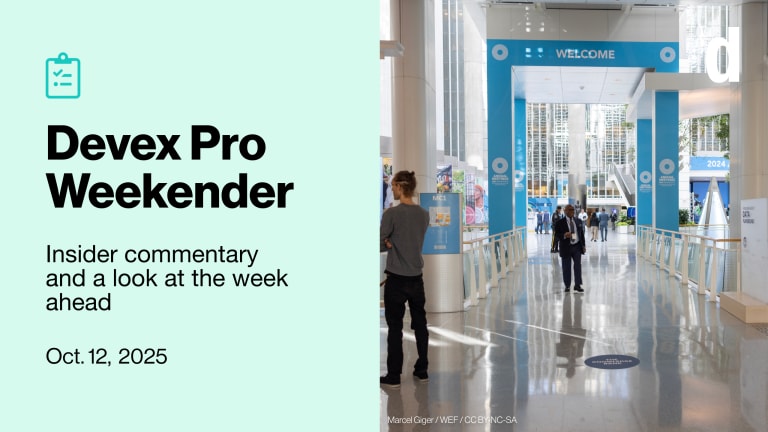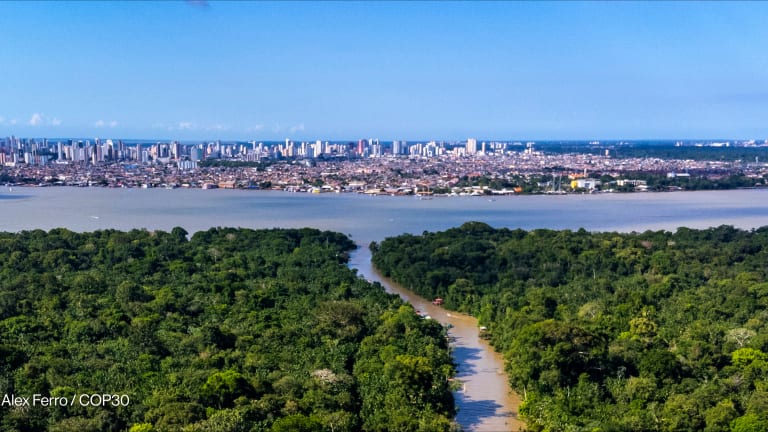
The United Arab Emirates is set to become the newest member of the European Bank for Reconstruction and Development, alarming rights activists who say the multilateral lender has strayed from its mandate to champion “multiparty democracy” and “pluralism.”
The move, first reported by Devex in October, was confirmed in a press release Tuesday explaining that the bank’s board of governors had approved the Persian Gulf state’s application. “The UAE can now complete the Bank’s membership process,” the release stated. “Once that has been finalised and all formalities have been met, the membership will become effective.”
An EBRD spokesperson confirmed that the UAE has asked to buy 37 paid-in and 166 callable shares at €10,000 ($12,000) each.
That would place it among the bank’s smaller shareholders, though the move remains troubling for NGOs that say the marriage contradicts the 1990 agreement establishing the bank. Article 1 states that EBRD’s purpose is “to foster the transition towards open market‐oriented economies and to promote private and entrepreneurial initiative in the Central and Eastern European countries committed to and applying the principles of multiparty democracy, pluralism and market economics.”
Claudio Francavilla, EU advocacy officer at Human Rights Watch, told Devex by email that EBRD “appears to be completely disregarding its mandate by ignoring the UAE’s appalling human rights record.”
“The bank claims that UAE's membership will bring many opportunities, but it is silent about the risks.”
— Fidanka Bacheva-McGrath, EBRD policy officer, BankwatchFrancavilla highlighted the case of Ahmed Mansoor, a human rights advocate in the UAE who was arrested in March 2017 and sentenced to 10 years in prison for “insulting the status and prestige of the UAE and its symbols, including its leaders” and “publishing false reports and information on social media.”
Amnesty International has also decried “arbitrary arrest and detention, torture and enforced disappearance,” as well as restrictions on freedom of expression, in the country of roughly 10 million people. The UAE did not respond to a request for comment.
The EBRD spokesperson told Devex that Article 1 covers the requirements for nations wishing to become “countries of operations” for EBRD — eligible to receive sovereign or private sector loans within their borders — whereas membership requirements are different. Article 3 of the bank’s founding agreement opens membership to non-European countries that are members of the International Monetary Fund, as is the case for the UAE.
“Members have to support the aims of the Bank as set out in our Article 1,” the spokesperson wrote. “By joining the Bank, UAE has affirmed that it does support the aims.”
EBRD has come under fire in the past for lending in countries with autocratic governments. And states with alarming human rights records, such as China, Egypt, and Russia, are already shareholders.
“Economically and businesswise, it’s a very justified move,” said a bank source who spoke to Devex on condition of anonymity, citing the potential for EBRD to partner with the UAE as the former expands its investments into Iraq and Algeria. “But it creates even more questions around our political mandate towards democratic systems.”
A second bank source, also speaking on condition of anonymity, told Devex that the UAE application had led some shareholders to suggest the bank needed a more detailed membership policy. The EBRD spokesperson did not respond to a request for comment on whether the bank would now work on more detailed membership criteria.
EBRD President Odile Renaud-Basso welcomed the move, calling the UAE “an important business and knowledge hub” and saying that “its membership will benefit many of the economies where the EBRD invests and will open up further opportunities across our regions.”
“The bank claims that UAE's membership will bring many opportunities, but it is silent about the risks,” Fidanka Bacheva-McGrath, EBRD policy officer at the NGO network Bankwatch, told Devex by email, questioning the bank’s systems for “human rights due diligence.”
UAE applies to join European Bank for Reconstruction and Development
A new strategy, new president, and potentially new members made for a big week for EBRD.
The move could also raise eyebrows in Brussels, where the European Commission counts EBRD among the contributors to its “Team Europe” exercise to foster greater coordination between EU institutions, member states, and financial institutions — notably, EBRD and the European Investment Bank, which declined to comment on the current situation.
At the same time, EBRD and EIB are tussling over which bank should take a greater role in steering EU development money abroad. EIB often vaunts the fact that it is wholly EU-owned, while EBRD argues that its 71 shareholders make it a “global bank with a European heart.”
Asked by Devex whether it supported the UAE joining EBRD, the European Commission ignored the question. Instead, a spokesperson from the international partnerships department gave a general response about the virtues of “Team Europe,” while a spokesperson from the European External Action Service wrote that, “The EU has regular Human Rights dialogue with our partners around the world, including the United Arab Emirates.”
A spokesperson for the ministry of foreign affairs of Spain, whose economy minister chairs EBRD’s board of governors, emailed Devex that, “Human Rights are always a concern for Spain,” but added that, “Other international organizations or institutions, having specific mandates on Human Rights, are more suited to work on this issue than the EBRD.”








